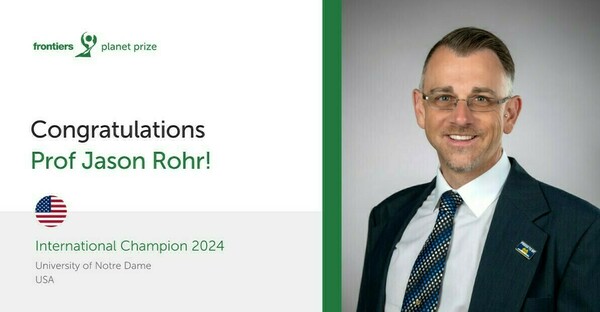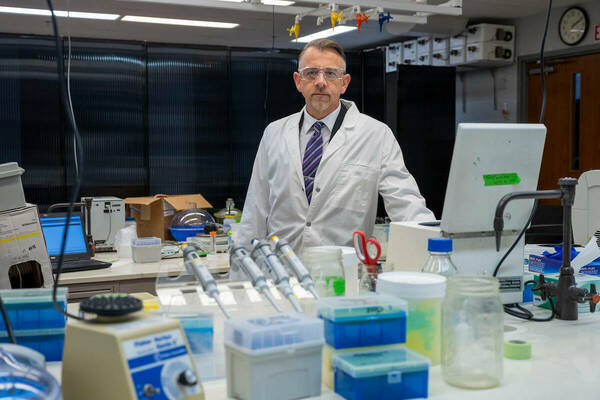Jason Rohr wins 2024 International Frontiers Prize for innovative public health and sustainability research
Jason Rohr, the Galla Professor and Chair of the Department of Biological Sciences at the University of Notre Dame, is one of three international winners of the 2024 Frontiers Planet Prize for his research that helps improve public health, agriculture, sustainability and poverty in Senegal.

Rohr was presented with the honor during a ceremony June 26 at the Villars Symposium in Villars-sur-Ollon, Switzerland. His research was selected from among the 23 national champions of the prize, which is administered by the Frontiers Research Foundation. Rohr, representing the United States, along with Pedro Jaureguiberry, representing Argentina, and Peter Haase, representing Germany, each received a prize of 1 million Swiss francs, equivalent to about $1.1 million. The money will be used to further his research.
Rohr’s winning research, “A planetary health innovation for disease, food, and water challenges in Africa,” was recommended by the National Academy of Sciences to a jury of 100 renowned sustainability and planetary health experts for the prize.
“My team and I are so shocked and thrilled to win this international prize,” Rohr said of the honor, which rewards and promotes breakthroughs that show the greatest potential to keep the earth from crossing what are known as “planetary boundaries.” These are processes that regulate the stability and resilience of earth systems, such as climate change, freshwater change and land system change.
“The Frontiers Planet Prize is a tremendous honor for Professor Rohr’s transformative research,” said John T. McGreevy, the Charles and Jill Fischer Provost at the University of Notre Dame. “We are deeply grateful for this award, which will enable Professor Rohr and his team to continue advancing scalable solutions that have the potential to enhance the lives of millions of people.
“As a leading global Catholic research university, Notre Dame is committed to caring for our common home and pursuing innovative solutions to the complex social and environmental crises our world is facing.”
Published in Nature in 2023, Rohr’s research focuses on reducing schistosomiasis, a parasitic disease affecting more than 250 million people worldwide that causes organ damage and death, and is transmitted to humans from freshwater snails that are infected with parasitic flatworms.
The snails that transmit the flatworm prefer to live in vegetation that proliferates partially because of fertilizer runoff. People can become infected multiple times when using waterways for washing and leisure, Rohr said.
However, Rohr and collaborators study more than ways to reduce disease. Their interdisciplinary approach includes removing snail-loving vegetation at water access points, composting the vegetation, feeding the vegetation to livestock and providing economic opportunities from the profitable compost and livestock feed.
“The generous grant that accompanies this prize will allow us to hone our remote sensing techniques for detecting the vegetation, testing whether communities sustain the intervention after education and training, scaling the innovation to other parts of Africa, and developing commercially viable scaling approaches,” said Rohr, who is affiliated with Notre Dame’s Eck Institute for Global Health and the Environmental Change Initiative. “This research has the potential to improve millions of lives because it equips these marginalized communities with the knowledge to develop sustainably, and to escape disease-poverty traps.”

Now in its second year, the prize is awarded by the Frontiers Research Foundation, based in Switzerland. The foundation has received prize nominations from 20 academies of science and 475 leading universities and research institutions among 43 countries. Launched by the foundation on Earth Day 2022, the Frontiers Planet Prize aims to mobilize science for a global green renaissance. The prize is endorsed by the International Science Council in its efforts to accelerate the most impactful scientific solutions.
Before being named as one of the three international prize winners, Rohr shared about his research in front of policy, practice and philanthropy thought leaders at the symposium led by the Villars Institute, an international nonprofit foundation dedicated to accelerating the transition to net-zero emissions. Rohr and the other national champions engaged with key planetary health experts, all of whom have the capability to shape policy and influence civil society.
The symposium also included a global cohort of system- and solution-oriented high school students from schools all over the world, which offered an additional chance to foster intergenerational collaboration and prepare the next generation to combat climate change.
“The remarkable contributions of the three international winners underscore the critical importance of interdisciplinary research in safeguarding our planet’s future. Their innovative approaches exemplify the spirit of the Frontiers Planet Prize, fostering a deeper understanding of planetary boundaries and providing a roadmap for a more sustainable and resilient world,” said Johan Rockström, chairman of the jury and pioneer of the Planetary Boundaries framework, in a news release.
Rohr’s research was funded by the National Institutes of Health, the National Science Foundation, the Indiana Clinical and Translational Sciences Institute and a Stanford University seed grant. A complete list of co-authors on the paper can be found at Nature.
Originally published by at science.nd.edu on June 26.
Latest Faculty & Staff
- Dockworkers reconsider strike that shut down East and Gulf Coast ports: A conversation with supply chain expert Kaitlin WowakThe union representing dockworkers at U.S. ports walked away from the negotiating table with port employers this week over automation concerns as the two sides face a mid-January deadline to finalize a deal and prevent the resumption of a strike. Business Analytics Professor Kaitlin Wowak discusses potential supply chain disruptions.
- When countries hide their true public debt, they hurt themselves, their citizens and their lendersGlobal public debt may soon collectively catch up to the worldwide gross domestic product (GDP), likely matching it by 2030. New research from a Notre Dame economist suggests that this could happen even sooner, thanks to countries’ hidden debts. This misreported debt can lead to higher interest rates for borrowers and lower recovery rates for lenders, suggesting indirect adverse effects on global financial stability and consumer welfare.
- Law School Professor Derek Muller joins CNN as contributor for 2024 presidential electionNationally recognized election law scholar Derek T. Muller, a professor of law at the University of Notre Dame Law School, has joined CNN as a contributor for the 2024 election cycle to provide his perspective and context to the network’s coverage of the presidential race.
- In memoriam: Rev. Gustavo Gutiérrez, O.P., renowned Notre Dame theologian, father of ‘liberation theology’Rev. Gustavo Gutiérrez, O.P., professor emeritus of theology at Notre Dame and widely regarded as the “father of liberation theology,” died Tuesday (Oct. 22) in Lima, Peru. He was 96.
- Notre Dame Forum to present ‘Fr. TED Talks’ on Catholic social tradition, featuring President Rev. Robert A. Dowd, C.S.C., and Dr. Jim O’ConnellHonoring the legacy of legendary University of Notre Dame President Rev. Theodore M. Hesburgh, C.S.C., the 2024-25 Notre Dame Forum will host “Fr. TED Talks: Ideas from the Catholic Social Tradition That We Find Inspiring,” a two-night festival on Oct. 28 and 29.
- Democrats and Republicans agree on one thing: Censoring hate speechIn an era of intense polarization, Democrats and Republicans have historically, and mistakenly, believed that members of the other party prioritize protecting certain types or victims of hate speech over others based on stereotypes or their affiliation with those potentially vulnerable groups. New research from the University of Notre Dame, however, revealed that partisans generally agree on what to censor when it comes to the target, source and severity of hate speech.













